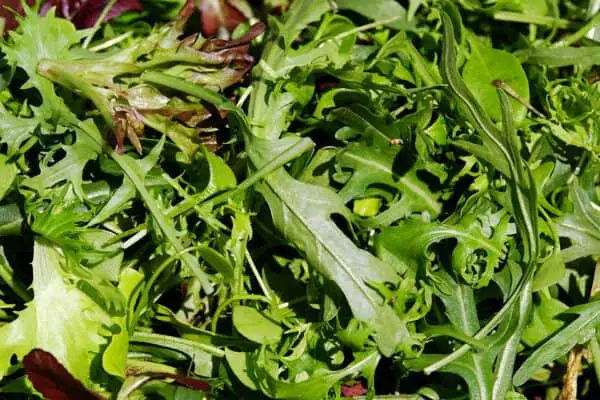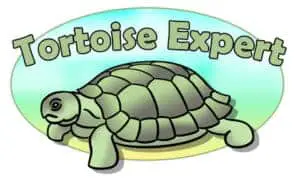
Tortoises can eat garden rocket, but it should only be given to them in moderation. When consumed in excess, garden rocket – also known as arugula or rucola – can increase the risk of developing kidney and bladder stones due to the goitrogens it contains.
Every tortoise needs a proper diet, one that allows it to absorb all the necessary vitamins and nutrients that help it stay healthy. At the same time, since you and I love our tortoises so much, we want to ensure they can enjoy delicious meals as well as healthy ones. So there’s a good chance you’re currently trying to think of various ways to make food more attractive for your tortoise, and from that garden rocket or rucola comes to mind. So the question is, can (and should) tortoises eat garden rocket?
While rocket is a very easily accessible item of produce, you probably don’t know how safe this leafy green is for your tortoise, and if it is safe, how much of it you should offer. Worry not because this article will tell you everything you need to know about garden rocket and whether you should feed it to your tortoise or not.
What Is Garden Rocket?
Garden rocket is a highly nutritious leafy green vegetable usually found in pre-prepared salad mixes in shops. It is also known under the names of arugula or rucola. The plant is part of the Brassicaceae family, similar to cauliflower and kale, and it is often used as a leaf vegetable. It is known to have quite a bitter taste.
The plant contains a lot of healthy vitamins that can help improve the health of anyone eating it. It is safe for humans to consume, which is of course one reason why it’s found so often in shops in bags of salad mixes. If you grow it yourself, you will be more than happy to know that the plant can tolerate dry and hot conditions, so it can be grown even in harsher conditions.
And of course in this case the good thing is that tortoises can also eat rocket, just make sure you don’t overdo it.
Can You Offer Garden Rocket to Tortoises?
As previously mentioned, yes, you can safely offer garden rocket to your tortoise, because it is very healthy, and the reptile can get some of the necessary vitamins out of it. So let’s consider some of the benefits- the plant contains a lot of essential vitamins and nutrients, such as:
- Vitamin A
- Vitamin B
- Vitamin C
- Vitamin K
- Iron
- Copper
- Iron
- Calcium
- Potassium
A lot of these vitamins and minerals are a must for the growth of a tortoise, but also to keep it healthy in the long term. Besides, they improve the biological processes and keep the tortoise in top shape.
Is Garden Rocket Fully Safe?
As you can see, garden rocket can be a rich source of vitamins and minerals. Still, you must keep in mind that not everything it contains is beneficial for your pet. The plant is not toxic, but it is a brassica, and as such it contains goitrogens – chemicals that can disrupt the production of hormones leading to potential health problems. In the case of a tortoise, when consumed at excessive levels goitrogens can lead to kidney and bladder stone formation.
Not to mention that you should never feed too much rocket in combination with other goitrogenic plants such as kale or collard greens. Ideally, you should only include one goitrogenic plant per meal. This way, the consumption of the compound will not exceed safe levels.
So, in short you can feed your tortoise garden rocket if it likes it but never go overboard, and do not feed it in combination with other brassica plants.
How Much Garden Rocket Is Too Much?
There may be many questions surrounding rocket and its addition to a tortoise’s diet. So far, we have established that the plant should only be given in moderation. How do you know when to stop, though? Can you give it on a daily basis? How many leaves is it okay to offer during one meal?
Well, tortoises need to have as varied a diet as possible. It is essential to feed them many leafy greens, and sometimes they can also eat fruits and vegetables. Your aim should be to not feed the tortoise the same things every day. While it is best to ensure that the pet gets the right nutrients from fresh veggies and greens, you should always change things around.
The theory here is that by varying things often you reduce the risk of your tortoise eating too much of a certain ingredient. It really is the old adage of ‘everything in moderation’ all over again.
So, that applies to garden rocket too. While feeding some rocket during one meal is alright, you should only offer it again after a few days. It is not necessarily unsafe to give rocket leaves once a day but changing things around will always be better, and it will also teach the tortoise to enjoy multiple foods instead of only a few.
On top of that, when you do offer rocket, it should also only be given in very small amounts, so a few leaves should be fine. Obviously, the leaves should be mixed with other greens during the same meal.
How Important Is Hydration when Feeding Garden Rocket?
Hydration is an integral part of having a healthy tortoise and drinking enough water will ensure the reptile stays hydrated at all times. Now, rocket is a plant that is composed of 90% water. Despite this fact, you should still give the reptile access to fresh water before, during, and after the meal. Besides this, it should also be soaked regularly.
Given that we know that garden rocket may increase the risk of kidney stones, it is always best to ensure the pet drinks as much water as necessary. This way, the urine will stay diluted, and hopefully keep any harmful compounds away by flushing them regularly.
The Bottom Line
Garden rocket can become a part of your tortoise’s diet as long as you make sure you offer it in small amounts. When offered in large quantities, it may increase the risk of kidney and bladder stones, which can be very painful and dangerous for your tortoise.
Mix garden rocket with other greens and safe ingredients that will provide your tortoise the necessary nutrients. By doing so, not only will you ensure proper nutritional intake, but you also prevent the tortoise from becoming fussy and developing kidney stones. We hope our article has answered your question and you can now prepare some delicious meals for your own lovely tortoise!


